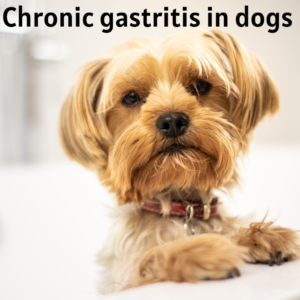
The causes, symptoms, and treatments of gastritis are briefly discussed below, followed by further details about gastritis in dogs.
Causes of Acute Gastritis
- Dietary dishonesty (ingestion of spoiled food, foreign bodies, plant material, hair or overeating)
- Intolerance or allergy to foods
- Consumption of irritants or poisons from chemicals (fertilizers, cleaning agents, lead)
- Drugs/medication (aspirin, antibiotics, steroids)
- Biological agents (viral, bacterial, parasitic)
- Sepsis or shock (systemic infection)
Causes of Chronic Gastritis
- Chronic or long-term consumption of any of the factors listed that can lead to acute gastritis
- Colitis of the bowels
- Belly cancer
Both acute and chronic gastritis can be accompanied by a few systemic illnesses. These include ulcers, hypoadrenocorticism, neurologic illness, liver disease, and renal failure. Males and females alike, as well as both dogs and cats, can be effected. Younger animals are more prone to consume inappropriate foods, which increases their risk of developing acute gastritis. Every age group can experience chronic gastritis.
What to Watch For?
- Excessive vomiting
- Excessive vomiting with blood (either red or “coffee-grounds”)
- Lack of appetite
- Weakness
- Weight loss
- Diarrhea
- Melena (black tarry stool representative of digested blood)
Diagnosis of Gastritis in Dogs
Numerous episodes of acute gastritis are transient, easily treatable, and rarely require a thorough diagnostic examination. People with severe, persistent, or systemic symptoms of sickness from gastritis should have a diagnosis made. Prior to doing a diagnostic evaluation, a comprehensive history and physical examination are of utmost necessity.
- An examination of the faeces, a biochemical profile, a complete blood count (CBC), and a urinalysis.
- X-rays of the abdomen plus a contrast/dye analysis
- Testing for parvo on all puppies
- Ultrasonography of the abdomen in some circumstances
- Endoscopy in certain situations
Treatment of Gastritis in Dogs
Your vet may suggest a number of options to symptomatically treat your dog. The major objectives of symptomatic therapy are to totally rest the gastrointestinal system and to restore and maintain fluid and electrolyte balance.
- Nothing oral (NPO) for several hours, followed by a bland food and a slow introduction of water.
- Treatment for dehydration in the patient with fluid and electrolyte replacement
- Antiemetics (drugs that symptomatically decrease the frequency of vomiting)
- Antacids (drugs that block acid production by the stomach)
- Stomach protectors (drugs that coat and soothe the GI tract)
Home Care
The main suggestion is to hold off on eating or drinking until you speak with your veterinarian. Only administer medication and diet as prescribed by your veterinarian, and keep a close eye on your dog. Immediately have your dog evaluated if clinical indications do not improve or if they worsen.

